https://www.al-akhbar.com/Literature_Arts/248759/معا-نعيد-البناء-قانون-الإنتخابات-بين-الواقع-والمرتج
Electoral Law, Between Reality and Prospective, in Lebanon and the Expansion countries
Loi électorale, entre la réalité et la prospective, au Liban et dans les pays de l’expansion Libanaise
قانون الإنتخابات بين الواقع والمرتجى، في لبنان والانتشار
Article in English
Arabic article published in AlAkhbar Journal (see link above)
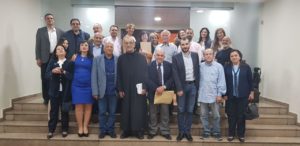
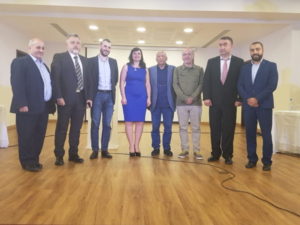
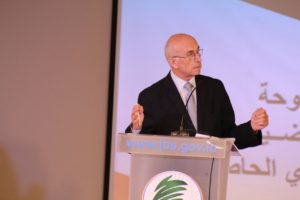
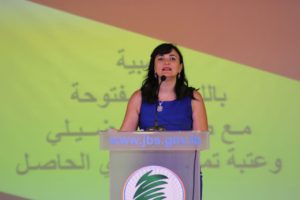
Reconstruire Ensemble Book’s commission in collaboration with the World Cultural Commission – WLCU held a round table on the “Electoral Law between Reality and Prospective, in Lebanon and the Expansion 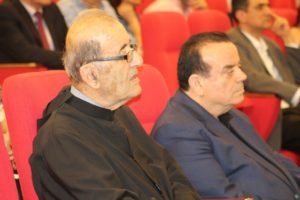 countries” on April 19, 2018 at the theatre of the municipality of Jdeideh – Baouchrieh – ElSed.
countries” on April 19, 2018 at the theatre of the municipality of Jdeideh – Baouchrieh – ElSed.
Moderated by Lawyer Rachid Aljalkh, President of Reconstruire Ensemble and with the participation of Mr. Kamal ElFeghali, statistical expert on electoral systems in Lebanon and around the World; Mr. Hassan Sakr, Director of International Relations of the Syrian Social National Party (SSNP); Eng. Hassan ElMokdad, Public Relations Officer for Mount Lebanon and North Lebanon regions in Hezbollah Party; Mr. Charle Saba, Advisor of the Kataëb President for the Administration of General Affairs; Eng. Jean 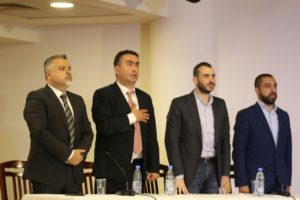 Khachane, Head of the General Electoral Machine of the Lebanese Forces Party; Dr. Sayed Younis, Head of the Electoral Machine of the 3rd district of North Lebanon of the Free Patriotic Party; Mr. Pierre Abi Saab, Editorial Vice-President of Alakhbar Journal; Dr. Christiane Saliba, Head of the World Cultural Commission – WLCU (cf. Lebanese Expansion ).
Khachane, Head of the General Electoral Machine of the Lebanese Forces Party; Dr. Sayed Younis, Head of the Electoral Machine of the 3rd district of North Lebanon of the Free Patriotic Party; Mr. Pierre Abi Saab, Editorial Vice-President of Alakhbar Journal; Dr. Christiane Saliba, Head of the World Cultural Commission – WLCU (cf. Lebanese Expansion ).
The Round table began by emphasizing the importance of culture in all its components, which gives an area of expression for each thought and belonging, within the creations of criticism, knowledge and science, which is the ultimate way to sow the culture of peace and convergence. From this area, where the faith in the homeland, democracy and citizenship brings us together, the objectives of this round table on the Lebanese electoral law have been highlighted with the participation of the parties and bodies mentioned.
The dialogue was conducted around two sets of questions, each of which answered by the participants according to the position of their parties or the civil society they represent. The first set is about the position and expectations of political parties of the electoral law and the second on the law effects on representation and citizenship.
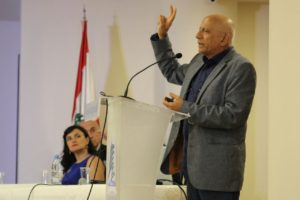 Mr. Kamal El Feghali presented the current law with amendments to the old law in terms of seats and the division of districts. This law was scientifically classified as “the proportional law with open lists with a preferential vote and a threshold of representation according to the electoral quotient.” He explained that there is no ideal law for elections in the world in terms of the principle of mathematics, but there is a law that serves specific goals, in a specific period, in a specific place and date. We have moved from the majority system to the proportional one demanded by multiple forces 15 years ago to correct representation. “There is no stable classification of the proportional electoral systems in the world,” he said. “There are 179 countries that adopt proportionality and each has its own system. The project is stronger than the voter and the electoral formula reflects the balance of power and achieves the goals.” He stressed that there are no clear criteria for administrative divisions and departments in terms of major and minor and in terms of calculating the electoral score of the lists and fractions. Circumscriptions, for example, are unbalanced with a denominational face to preserve denominational representation especially the christian’s one in accordance with the Lebanese Constitution. Differences are noticed, and for example, the new law states that Christians’ ability to bring Christian deputies has improved, with 22 deputies now joining 54 out of 64 deputies. He pointed out mistakes in the law; the preferential vote limited to the circumscription is against the spirit of proportionality. It is also an absurdity to make individual candidacy in this law, the parties should provide their candidates in combined lists instead of individual nomination and alliances that have nothing to do with politics and are not imposed by law.
Mr. Kamal El Feghali presented the current law with amendments to the old law in terms of seats and the division of districts. This law was scientifically classified as “the proportional law with open lists with a preferential vote and a threshold of representation according to the electoral quotient.” He explained that there is no ideal law for elections in the world in terms of the principle of mathematics, but there is a law that serves specific goals, in a specific period, in a specific place and date. We have moved from the majority system to the proportional one demanded by multiple forces 15 years ago to correct representation. “There is no stable classification of the proportional electoral systems in the world,” he said. “There are 179 countries that adopt proportionality and each has its own system. The project is stronger than the voter and the electoral formula reflects the balance of power and achieves the goals.” He stressed that there are no clear criteria for administrative divisions and departments in terms of major and minor and in terms of calculating the electoral score of the lists and fractions. Circumscriptions, for example, are unbalanced with a denominational face to preserve denominational representation especially the christian’s one in accordance with the Lebanese Constitution. Differences are noticed, and for example, the new law states that Christians’ ability to bring Christian deputies has improved, with 22 deputies now joining 54 out of 64 deputies. He pointed out mistakes in the law; the preferential vote limited to the circumscription is against the spirit of proportionality. It is also an absurdity to make individual candidacy in this law, the parties should provide their candidates in combined lists instead of individual nomination and alliances that have nothing to do with politics and are not imposed by law.
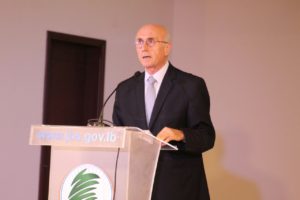 Mr. Rachid Jalkh began the debate with the concept of federalism between confessional communities in the composition of the parliament in Lebanon cited by Michel Chiha and GhassanTueini. He said that the new electoral law has been described by some as introducing Lebanon to the field of modernity in the proportional electoral laws, while others said that it is the law of Cain and Abel that obliges each party to seek its own interest even if he had to sacrifice his allies.
Mr. Rachid Jalkh began the debate with the concept of federalism between confessional communities in the composition of the parliament in Lebanon cited by Michel Chiha and GhassanTueini. He said that the new electoral law has been described by some as introducing Lebanon to the field of modernity in the proportional electoral laws, while others said that it is the law of Cain and Abel that obliges each party to seek its own interest even if he had to sacrifice his allies.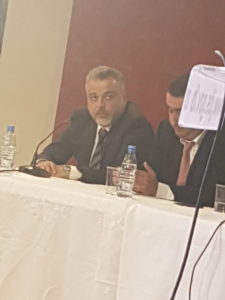
Mr. Hassan Sakr, considers his party as trans-denominational calling for proportionality since 1960. The current proportional law is hybrid but at the same time it is a shift from the majority system that encourages sectarianism, customerism and money to the proportional system. The objectives of each election law: representation of people and the qualitative transition of society forward. The most appropriate solution remains in the law of full proportionality on the basis of one circumscription outside the confessional system, while strengthening the parties of citizenship and enhancing their diversity so that the party does not represent the confessional community.
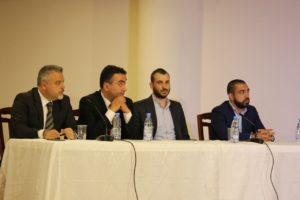 Dr. Sayed Younis stressed that the law has been the result of several attempts since 2005 to correct representation, especially the Christian one, which has been absent for a long time. Article 24 of the Lebanese Constitution protects the equality and it is the case in the current law, although the proportion of Christians is 36% and the proportion of Muslims is 54%.
Dr. Sayed Younis stressed that the law has been the result of several attempts since 2005 to correct representation, especially the Christian one, which has been absent for a long time. Article 24 of the Lebanese Constitution protects the equality and it is the case in the current law, although the proportion of Christians is 36% and the proportion of Muslims is 54%.
Lebanon is based on contradictions and confessions in the souls before the texts. The current law tried to activate representation and facilitate 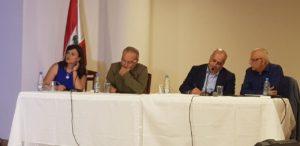 it at home and abroad, but was not approved by the parties to adopt proposals of Mega Center and extension of registration for Lebanese abroad and they imposed pre-registration. The Free Patriotic Party is in a constant quest to join the Lebanese in everything to get to the civilized interaction between them as Lebanese and to search Lebanon outside the family, the tribe and the community.
it at home and abroad, but was not approved by the parties to adopt proposals of Mega Center and extension of registration for Lebanese abroad and they imposed pre-registration. The Free Patriotic Party is in a constant quest to join the Lebanese in everything to get to the civilized interaction between them as Lebanese and to search Lebanon outside the family, the tribe and the community.
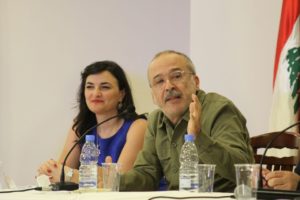 Mr. Pierre Abi Saab commented that he does not find a place for him as a citizen in the figures presented in the law. For him, it is a law that strengthens the sectarian system and does not open room for disagreement. The formula in Lebanon at the present time is “corruption and confessionalism”, and “disadvantage”, according to Abi Saab, is “de facto forces.” The biggest trap is that the law does not take us to an alternative solution. The injustice is to leave the citizen at the gates of hospitals … Civil society is currently shackled and there are no political forces that can impose things on authorities.
Mr. Pierre Abi Saab commented that he does not find a place for him as a citizen in the figures presented in the law. For him, it is a law that strengthens the sectarian system and does not open room for disagreement. The formula in Lebanon at the present time is “corruption and confessionalism”, and “disadvantage”, according to Abi Saab, is “de facto forces.” The biggest trap is that the law does not take us to an alternative solution. The injustice is to leave the citizen at the gates of hospitals … Civil society is currently shackled and there are no political forces that can impose things on authorities.
The solution was also put forward in an electoral system on the basis of a single constituency outside of the denominational constraint. In order for proportionality to take its meaning, it must not fall into the trap of the confession, which is an identity of faith, not a national one, and the adoption of democracy will be by the abolition of the confessional character of the political system.
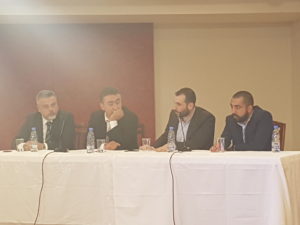 Mr. Jean Khashan set out the Lebanese Forces’ aspirations to make Lebanon a country that respects the citizen in every sense of the word. The first part of treatment is acknowledging reality. To reach that, there is a road map that includes: the creation of a local authority with decentralization, a senate representing the Lebanese confessions, and deputies sitting outside the sectarian restriction.
Mr. Jean Khashan set out the Lebanese Forces’ aspirations to make Lebanon a country that respects the citizen in every sense of the word. The first part of treatment is acknowledging reality. To reach that, there is a road map that includes: the creation of a local authority with decentralization, a senate representing the Lebanese confessions, and deputies sitting outside the sectarian restriction.
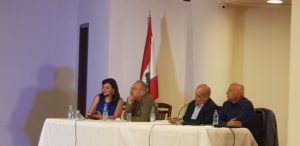 From now on to reach this point, there is a solution and a definition of goals. As for the election law, its aim was to return to the national Lebanese chart in Lebanon after long-term marginalization of Christians. That Christians become active partners in the production of power, moral existence above all. In the previous law, Christians were absent from many circles. The first objective of the Lebanese Forces was to seek a law, whatever its wording that restores the Christians representation according to the Lebanese National Chart. The second one is to reinforce by this law, the party work.
From now on to reach this point, there is a solution and a definition of goals. As for the election law, its aim was to return to the national Lebanese chart in Lebanon after long-term marginalization of Christians. That Christians become active partners in the production of power, moral existence above all. In the previous law, Christians were absent from many circles. The first objective of the Lebanese Forces was to seek a law, whatever its wording that restores the Christians representation according to the Lebanese National Chart. The second one is to reinforce by this law, the party work.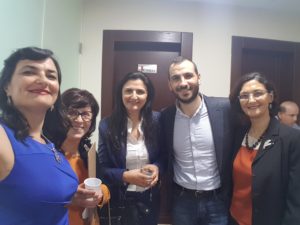
The following steps were taken: the amendment of the law, to pass from 31 to 54 Christian deputies elected from Christians, minorities such as the Alawites who had representatives, and minorities’ representation in each constituency became possible. It remains to be achieved in all electoral districts in 6% of the balance.
Lebanon is tired of despair, and culture is the biggest entrance to hope. The law is a qualitative leap forward and should be illuminated from this point, noting the improvement of what should be improved in its application over time.
Mr. Charles Saba explained that the debate today is between two extremes: the National Chart, equality on the one hand and citizenship and opening the system to more secularism on the other. That is, going from confessional federalism to a system that respects the citizen and respects groups that have a community’s diversity in the country.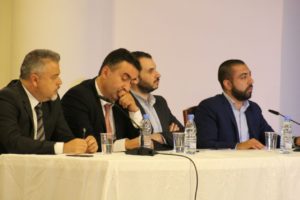
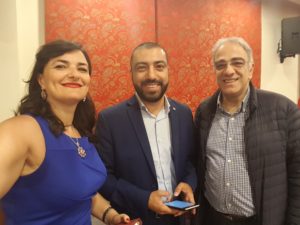 Today’s facts are: The dissociation of the MP’s role which is representing the citizen, as well as his doctrine, region; the National chart and its respect despite the demographic imbalance; the binaries and the unilateralities of the country. These unilateralities and binaries may take us in the event of disagreement into civil wars and in the case of consensus to the governments of quotas and probably go public debt to the limits we cannot then speak citizenship.
Today’s facts are: The dissociation of the MP’s role which is representing the citizen, as well as his doctrine, region; the National chart and its respect despite the demographic imbalance; the binaries and the unilateralities of the country. These unilateralities and binaries may take us in the event of disagreement into civil wars and in the case of consensus to the governments of quotas and probably go public debt to the limits we cannot then speak citizenship.
Kataëb law’s expectations: Solve the issue of split MP, go towards pluralism and the formation of a system of pro-government and opposition to accounting and control, that is, creating the system garde-fou, Check balanced, go to the concerns and resolve by the adoption of the Lebanese chart. Current law is better than the law of the sixties, but it contained ambiguities concerning the preferred vote and voting in circumscription or district which can have similarities with the majority one in addition to the risk of inhibiting the creation of pro and opposition groups by the high score of the confessional quota.
The Kataëb aspiration is for a proportional system based on one constituency, with creation of a confessional senate and a parliament outside the sectarian restriction. In parallel, working on the party law in Lebanon to support political parties instead of what is currently happening like blowing up political parties form within and supporting businessmen and money. Finally, support the quota of women candidates.
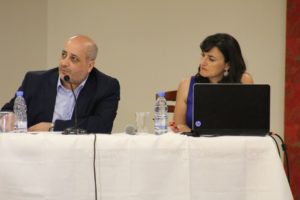 Mr. Hassan Mokdad then referred to the explanation of the Shiite dualism as party and patriotic dualism, incarnated by Amal and Hezbollah. Mokdad stressed that proportional law has been Hezbollah’s demand since 2000. He described it as the main entry point in Lebanon to reshape political life. The biggest question remains for him about what services have been provided to the citizens’ needs in Lebanon. Proportional current system on the basis of the 15 constituencies meets some of the party’s ambitions, but the biggest aspiration is for Lebanon to become one constituency.The social structure of the party may give it a confessional but patriotic color. In this law, some parties are prohibited from discharging their constituents by limiting them to a geographical constituency.
Mr. Hassan Mokdad then referred to the explanation of the Shiite dualism as party and patriotic dualism, incarnated by Amal and Hezbollah. Mokdad stressed that proportional law has been Hezbollah’s demand since 2000. He described it as the main entry point in Lebanon to reshape political life. The biggest question remains for him about what services have been provided to the citizens’ needs in Lebanon. Proportional current system on the basis of the 15 constituencies meets some of the party’s ambitions, but the biggest aspiration is for Lebanon to become one constituency.The social structure of the party may give it a confessional but patriotic color. In this law, some parties are prohibited from discharging their constituents by limiting them to a geographical constituency.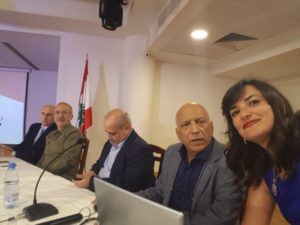
We moved from the sectarian concept of “community represents the community” in 1975 to the national and political concept (blocs 8 and 14 March) in 2005 when we felt the existential threat entity. The economic situation that is collapsing in addition to the regional changes and the economic situation push to strengthen the spirit of citizenship out of fear of partisan measurement to measure the citizen and his suffering. Our fear of each other disrupts the Lebanese ability to innovate. The party seeks to return the emigrants and to give citizenship to the sons of Lebanese women. It requests to improve the national vote and raise the threshold to 10% of the total electorate then the alliance of Islamic parties with Christian parties to reach power will be required.
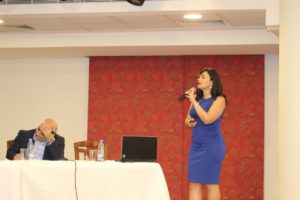 Dr. Christiane Saliba addressed the Lebanese expansion vote in approaching the current 2008 law and the future law of 2017 voted for the next electoral cycle. She noted the concerted efforts in the embassies and consulates in the host countries to facilitate the first vote for non-resident Lebanese in the world. She explained that non-resident Lebanese opinion is divided between the two laws and each one has its negative and positive dimensions. The 2008 law, in which the non-resident Lebanese votes for the
Dr. Christiane Saliba addressed the Lebanese expansion vote in approaching the current 2008 law and the future law of 2017 voted for the next electoral cycle. She noted the concerted efforts in the embassies and consulates in the host countries to facilitate the first vote for non-resident Lebanese in the world. She explained that non-resident Lebanese opinion is divided between the two laws and each one has its negative and positive dimensions. The 2008 law, in which the non-resident Lebanese votes for the 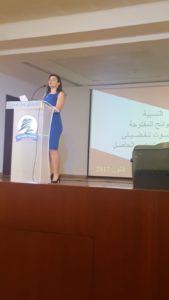 deputies of his region in Lebanon, ensures attachment to the homeland and confessional balance, but the young descendants do not know the candidates. The 2017 law guarantees the election of six expansion representatives equally between Christians and Muslims. The question remains about this sectarian distribution and its problems. For the 2018 election, about 90,000 voters abroad are registered. Perhaps this number will rise especially with the current Law on the restitution of Lebanese nationality, is the six MP will be sufficient? How will be done the confessional distribution norms for the 6 deputies? Many questions would require strategic responses.
deputies of his region in Lebanon, ensures attachment to the homeland and confessional balance, but the young descendants do not know the candidates. The 2017 law guarantees the election of six expansion representatives equally between Christians and Muslims. The question remains about this sectarian distribution and its problems. For the 2018 election, about 90,000 voters abroad are registered. Perhaps this number will rise especially with the current Law on the restitution of Lebanese nationality, is the six MP will be sufficient? How will be done the confessional distribution norms for the 6 deputies? Many questions would require strategic responses.
In conclusion the participants expressed clearly their support for proportional electoral system. They also stated their support for the proportional electoral law based on one constituency with the adoption of the confessional Senate and the council of deputies outside the sectarian restriction except for the Free Patriotic Party and with the emphasis of the Lebanese Forces Party on the need to step in stages to get to that. The parties of Christian affiliation stressed on the Lebanese Chart and Christian representation, which moved from 30% to 54%. The concern for citizenship is common to all but it is currently a confessional reality under the prevailing system and the confessionnalism of souls;
The aspirations concerning the current electoral law remain in its amendment to better representation and to address the negative gaps in its application.
The cultural space of the Round Table opened up horizons for future projects that would promote citizenship and pluralism within one community. The participants defended the citizen’s right to live a decent life first by supporting the health, education and social services that make him proud to belong to a country that respects confessions and multi-party within one community in an atmosphere of equality and respect of the Lebanese Chart.
Recognizing the other, not fearing him, to meet In diversity around a common memory and oriental common heritage among Lebanese people are the means to help the souls to face mutual sectarian fear, to be proud of its belonging to a country called Lebanon that respects its history and learns from its past and suffering.
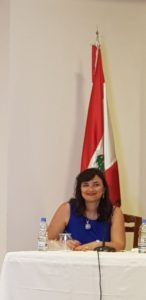 Dr. Christiane Saliba
Dr. Christiane Saliba
Book Commission coordiantor-Reconstruire Ensemble
Head of the World Cultural Commission – WLCU
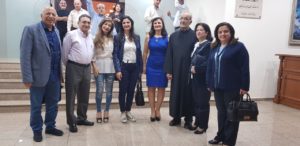
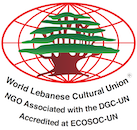 World Lebanese Cultural Union
World Lebanese Cultural Union

